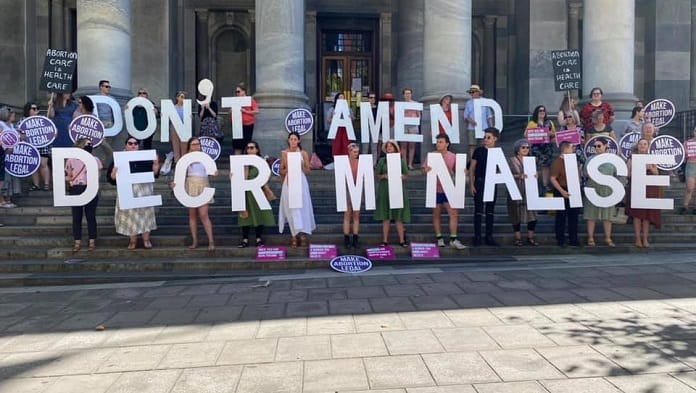A Bill to remove abortion from the criminal law passed in South Australia’s lower house in the early hours of 19 February, with a large margin of 29 votes to 15. Amended by typical anti-choice attempts to limit women’s rights, particularly regarding late-term abortions, it now goes to the upper house for final ratification.
SA was the first state to reform anti-abortion legislation in 1969 but abortion remained subject to the 1935 Criminal Law Consolidation Act. Decriminalisation removes the stigma of criminal action surrounding doctors and women accessing a simple health procedure.
The new Act will improve access to facilities and also allows better access to medical abortion (using the drug RU486) and telehealth. Currently even medical abortions have to be performed in approved medical facilities, usually hospitals. Rural women are particularly disadvantaged. Women just over the border, but living closer to Adelaide than other cities, will welcome the removal of the rule that only those living in SA for two months can access the procedure.
Dr Erica Millar, spokesperson for the SA Abortion Action Coalition (SAAAC), said: “It’s not just accommodation, it’s child care, it’s time off work … There’s a two-week wait between calling and being able to attend your initial appointment, and then after your initial appointment there’s a further one or two weeks on top of this where you have to wait for surgical treatment, so this is women having to wait for a month while pregnant and not wanting to be.”
Time is important to access abortion early and safely. Abortion must be available as early as possible, but as late as necessary. Yet politicians continue to tolerate anti-abortionists’ proposals which cause delay and undermine access for the tiny number of late-term abortions that become necessary.
Anti-abortion forces campaigned inside and outside parliament, mischievously claiming late-term abortion amounts to “child-murder”. The cashed-up anti-abortion Right to Life and Love Adelaide supported a thousands-strong Walk for Life against “Abortion up to Birth”. The Australian Christian Lobby campaigned against what they said was “abortion to birth” legislation.
The final version of the Act will be something similar to those in other states and territories, apart from the ACT which is the only jurisdiction to fully excise abortion from its criminal code. In other states/territories, gestational limits set cut-off points for late-term abortions, which are restricted and require doctors/specialists decisions.
For example, in Victoria, the Abortion Law Reform Act (2008) permits women to request and doctors to perform an abortion within the period up to 24 weeks of pregnancy. After 24 weeks, late-term abortions are permitted only if two doctors are in agreement that the abortion is appropriate; penalties apply for unlawful abortion, but pregnant persons/women are no longer liable at all.
The SA law will allow abortions up to 22 weeks and six days. The right failed to win support for further gestational limits but succeeded in amending the Bill to undermine the significant list of reasons late-term abortions are needed. Their amendments restrict approval for late-term abortions unless there is:
- a threat to the life of the pregnant person or another foetus or
- a significant risk of serious foetal anomalies associated with the pregnancy.
Anti-abortion amendments also require unnecessary mandatory counselling requirements, potentially causing delays to access early abortion. Several amendments were added to the Bill to strengthen provisions around informed consent. Yet all health procedures, including abortion, already require informed consent of the patient.
The lower house also passed an amendment, regarded by many as racist stereotyping of certain communities, that prevents so-called sex-selection abortion. However, anti-trans bigots failed to change the wording of the Bill from “pregnant persons” to “women”.
Previously, in late 2020, pro-choice activists won separate legislation to secure Safe Access Zones. This means people seeking abortions and the health care workers who provide them will have legal protection from harassment and intimidation.
Introduced by the Liberal attorney-general, Vicky Chapman, the Bill was supported by most Labor politicians. Shamefully, three Labor MPs voted against the Bill, including right-wing frontbencher Andrea Michaels, who was the only woman to vote against. The “conscience vote” which allows individual MPs to vote against the party policy is undemocratic and should be abolished.
Today the vast majority of ALP voters support a woman’s right to choose. Abortion is the most common surgical procedure performed in Australia with an estimated 80,000 conducted each year.
This legislation helps remove the danger of illegality and stigma. The campaign helped lift taboos on abortion discussions. However, the ongoing organised response from the right internationally sends a signal that there is no room for complacency.
Abortion restrictions remain a reminder of the oppression of women under capitalism.
The SAAAC has been campaigning for five years, supported by 32 health, legal and community organisations, including two unions (Australian Education Union and Australian Nursing and Midwifery Federation) and the Working Women’s Centre.
With unions the largest organisations of working class people and women more than half the two million-strong membership, the union movement has a social power which could be tapped further.
Safe reliable reproductive healthcare for all pregnant persons, including rights to abortion, is union business. It’s fundamental to our full participation in society including the right to work.
By Judy McVey
Judy McVey is the author of the Solidarity pamphlet, Abortion: The fight that is still to be won.






